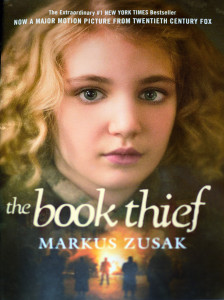
“You are going to die,” prefaces Death in this strangely beautiful but harrowing tale of “The Book Thief.”
Marcus Zusak’s New York Times best-selling novel “The Book Thief,” though published in 2005, is the newest film in a long line of book-to-film adaptations (like “The Hunger Games” series and “The Mortal Instruments: City of Bones”) that has finally made it to the big screen. But fans of the novel may just find themselves torn. While director Brian Percival (Downton Abbey) does a fantastic job of capturing the complexity of the 552 page novel, the film falls just short of spectacular with some of its structural and emotional pitfalls.
The film, set in Nazi Germany, follows Liesel Meminger (Sophie Nélisse), a tenacious young girl who finds solace in books as the world around her slowly falls prey to Hitler’s regime. The film opens with the death of Liesel’s younger brother, leaving her feeling robbed and alone. But, “when life robs you, sometimes you have to rob it back,” and that’s exactly what she does. As she watches her brother being buried, she picks up a dropped book, “The Gravedigger’s Handbook,” the first of many that she steals.
She soon finds herself on Himmel Street (which ironically translates to heaven street), a German working-class neighborhood that seems to be perpetually covered in dirt and grime. Upon arrival, we meet Liesel’s foster parents—the kindly Hans Hubermann (Geoffrey Rush), who is good to a fault, and the prickly but kind-hearted Rosa (Emily Watson) who can’t seem to form a complete sentence without calling someone a “saukerl” (a pig). Then there’s the too-mischievous-for-his-own-good Rudy Steiner (Nico Liersch), the boy next door, who immediately befriends Liesel (and can’t help asking her for a kiss any chance he gets).
The transition into this new town, new family and new school is difficult for Liesel—she’s lost her brother, feels abandoned by her mother and has to deal with snotty kids who pick on her for not being able to read—but with courage and a little help from Hans, who reads with her every night and even paints a dictionary on the basement wall to practice, she finds power in words. And so, at a Nazi rally that aims to cleanse Germany “morally and intellectually” of “any intellectual dirt” contained within books, Liesel steals a book from the fire pit, cementing her status as “the book thief.”
Life on Himmel Street appears to be fairly removed from the perils of World War II until the arrival of Max (Ben Schnetzer), a Jewish acquaintance of Hans, who knocks on the Hubermann’s door in the middle of the night. Despite their meager living situation, they offer Max a safe place. It’s not long before Max and Liesel connect over their shared love of words, but nothing is safe from the destruction of the war and Himmel Street is smack dab in the middle of it.
With over 500 pages of material to cover, it was completely unexpected for the film to remain as faithful to the book as it was. But, because of the book’s dense material, not all of it translated well from book to screen. The choice to keep Death (Roger Allam) as the narrator was a pleasant surprise, but seemed out of place—it can take you out of the more serious moments, leaving you wishing for that emotional punch in the gut. The film lacked sincerity in regard to the effects of the war—Percival’s vision was just too clean that the magnitude of the Holocaust is overlooked. It seems Percival was trying to cram every aspect of the book into the film, but with a running time of only two hours and seven minutes, some plot points were reduced to single lines and the ending was such a blur of events there was barely any time to feel for the characters.
The entire film just seemed to be lacking, but it certainly wasn’t in the acting department. Veteran actors Geoffrey Rush and Emily Watson bring the emotional complexity that the film was sorely missing—Rush, with the perfect balance of humor and sentiment, characterizes the compassion of Hans Hubermann flawlessly, while Watson, with just the right amount of vulnerability, perfectly embodies the “thunderstorm” that is Rosa Hubermann.
But it is the young actors especially that deserve praise for their performances—Sophie Nélisse and Nico Liersch do a fantastic job of holding their own on screen while portraying their characters to a tee. Nélisse portrays Leisel with such confidence and really captures that headstrong mentality, while Liersch will break your heart with his honest portrayal of the relentlessly loyal Rudy Steiner.
Despite its shortcomings, “The Book Thief” is without a doubt one of the best book-to-film adaptations this year. Unfortunately, the underdevelopment of serious plot points and overall lack of emotional depth really compromises the film’s impact, earning it two out of four stars. Even so, the film was joy to watch on many levels and I would recommend it to anyone, whether they are a fan of the book or just the average moviegoer.








